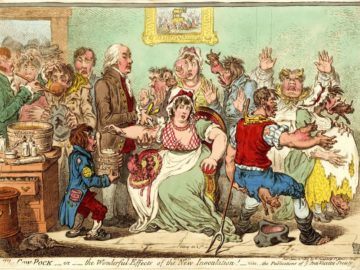Alicia Ault in Smithsonian:
 As long as vaccines have existed, humans have been suspicious of both the shots and those who administer them. The first inoculation deployed in America, against smallpox in the 1720s, was decried as antithetical to God’s will. An outraged citizen tossed a bomb through the window of a house where pro-vaccination Boston minister Cotton Mather lived to dissuade him from his mission. It did not stop Mather’s campaign.
As long as vaccines have existed, humans have been suspicious of both the shots and those who administer them. The first inoculation deployed in America, against smallpox in the 1720s, was decried as antithetical to God’s will. An outraged citizen tossed a bomb through the window of a house where pro-vaccination Boston minister Cotton Mather lived to dissuade him from his mission. It did not stop Mather’s campaign.
After British physician Edward Jenner developed a more effective smallpox vaccine in the late 1700s—using a related cowpox virus as the inoculant—fear of the unknown continued despite its success in preventing transmission. An 1802 cartoon, entitled The Cow Pock—or—the Wonderful Effects of the New Innoculation, depicts a startled crowd of vaccinees who have seemingly morphed into a cow-human chimera, with the front ends of cattle leaping out of their mouths, eyes, ears and behinds. Paul Offit, director of the Vaccine Education Center at the Children’s Hospital of Philadelphia, says the outlandish fiction of the cartoon continues to reverberate with false claims that vaccines cause autism, multiple sclerosis, diabetes, or that the messenger RNA-based Covid-19 vaccines from Pfizer/BioNTech and Moderna lead to infertility. “People are just frightened whenever you inject them with a biological, so their imaginations run wild,” Offit recently told attendees of “Racing for Vaccines,” a webinar organized by the Smithsonian’s National Museum of American History. “The birth of the first anti-vaccine movement was with the first vaccine,” says Offit. People don’t want to be compelled to take a vaccine, so “they create these images, many of which obviously are based on false notions.”
More here.
